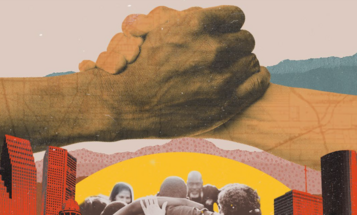
When you look closer at what is happening in our society, it is clear that GDP growth has failed to deliver. For example, while GDP roughly doubled between 1980 and 2007, the distribution of all that money has left us more unequal today than at any time since the 1920s. GDP, in other words, tells us nothing about how national income is distributed, and it ignores the negative economic consequences of inequality.
Whether one person captured all the income, or if every person got an equal share, the GDP growth rate (and the rate of "progress") would be the same. In fact, nearly all of our national growth since 1980 went to the top 20 percent, and in the six-year expansion preceding the Great Recession, nearly two-thirds went to the top 1 percent alone.
This kind of highly unequal growth turns out to be very little growth from the standpoint of human welfare, for the simple reason that adding income at the top brings almost no marginal improvement in welfare compared to adding income at the bottom.
Beyond distribution, GDP has other serious problems, in three basic categories. GDP counts many economic "bads" as goods; it completely ignores other economic bads; and it completely ignores many economic goods that have significant value but no market price.
According to GDP, a hurricane cleanup "grows" our economy just like higher manufacturing output does, even though the former doesn't actually improve our overall welfare. Likewise, GDP does not reflect the cost of environmental degradation or pollution. While we count the value of coal-fired electricity in our GDP, we do not include the significant health costs from coal pollution (in fact, studies show that coal-fired electricity generates a net loss of GDP once the health costs are incorporated). Finally, not everything with a value has a price; indeed not everything with important economic value has a price. But GDP has no way of accounting for such things.
If you hire a nanny to watch your kids, you are adding to GDP. If you stay at home to look after your children yourself, you are not adding to GDP, even though the same (or better) service is provided. Volunteering and community activities are similarly uncounted, as is (probably much more significantly) the human and intellectual capital created by public investments in education, health, and research. The value of ecosystem services like drainage and carbon absorption is also ignored, such that when these things are destroyed, the losses are not counted. Obviously, political incentives to protect the environment and other non-market goods are weakened if we do not count the losses or value the potential benefits of these goods.
As documented in a new report, Beyond GDP: New Measures for a New Economy, researchers have been working to correct and augment GDP for more than 30 years, in order to provide a more complete and accurate picture of economic progress. France’s Commission on the Measurement of Economic Performance and Social Progress, led by Nobel-laureate economist Joseph Stiglitz, has drawn worldwide attention to these issues and set the parameters for robust implementation of alternative indicators in 21st century governance. Maryland’s recently adopted Genuine Progress Indicatoradjusts the state’s Gross State Product with more than 20 different economic, environmental and social variables, resulting in a measure of the state’s "sustainable economic welfare" as contrasted with its market growth.Well-being and happiness indicators are also gaining traction in national, state, and local settings.



